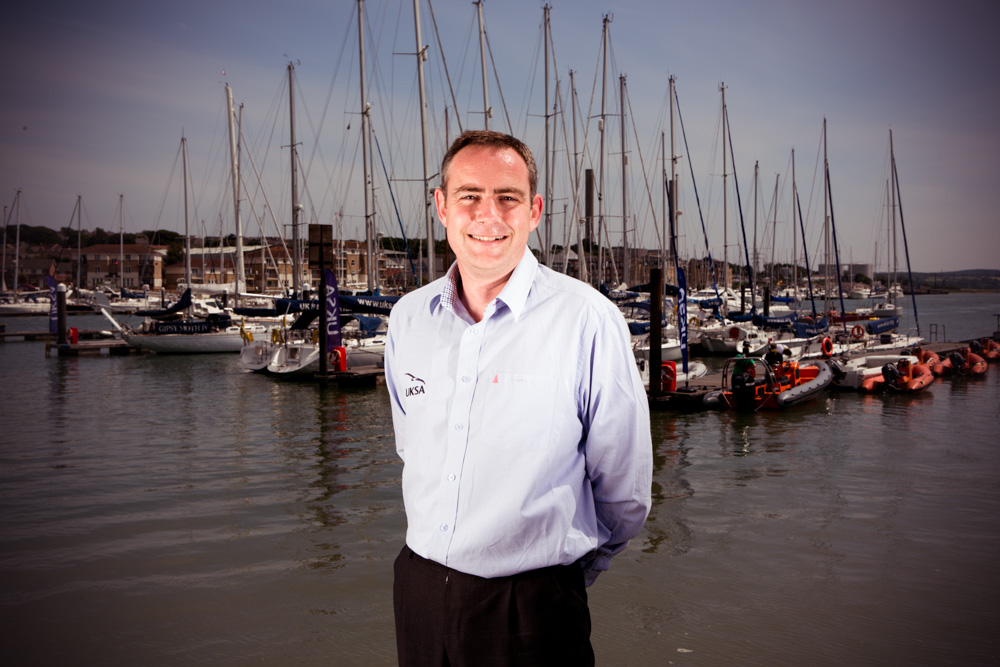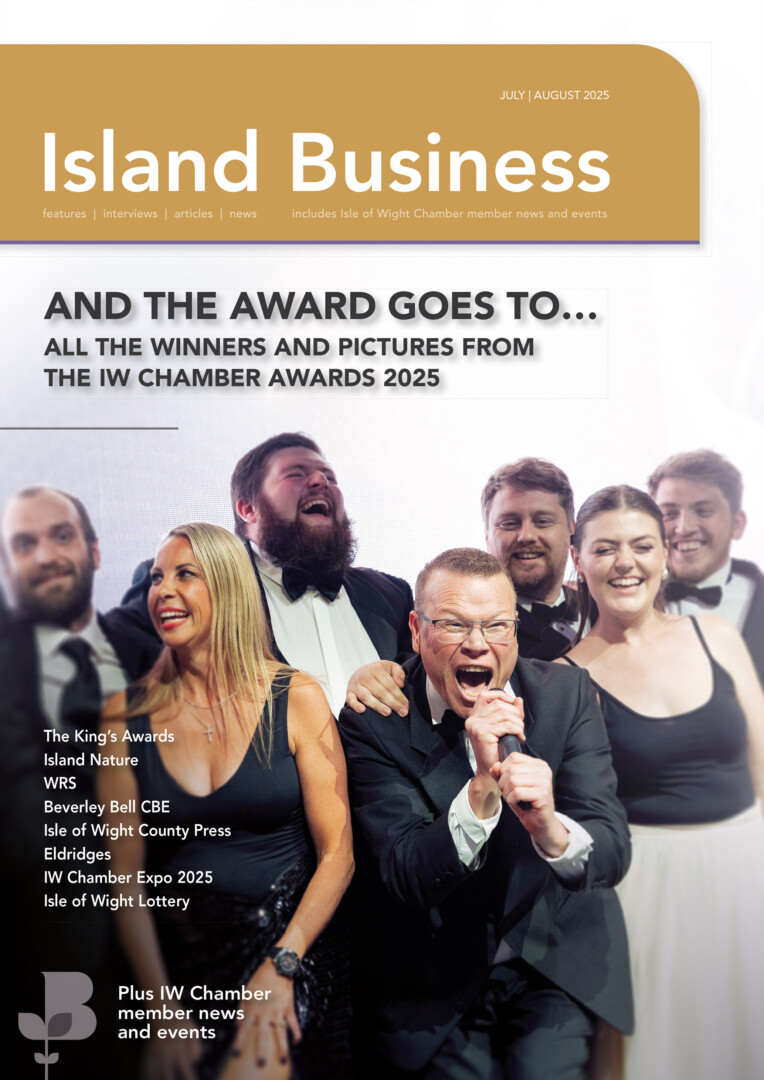UKSA is a youth charity based in Cowes, set up 27 years ago. It works with thousands of young people every year, providing transformational opportunities through sailing and watersports. Tom Stroud talks to Richard Thornton, UKSA’s Chief Executive.
How important is the Isle of Wight to UKSA?
The Isle of Wight is the home of yachting for me. As a maritime charity, where better for us to be based than in Cowes? UKSA is partly about yachting and we’re partly about watersports but there’s definitely a history here and that informs what we do today. We nurture the future gold-medallists, the future skippers of yachts, people who are earning a living from watersports industry, from yachting and sailing. There are loads of careers out there too. For the first time since I’ve been here at UKSA, we’ve got more jobs than we have people coming through our qualifications. That’s really unusual. The industry is coming back to life and there are jobs all over the world for our graduates; there are also jobs here on the Isle of Wight. Our youth development programmes have been very successful in removing the barriers to employment, as somehow us getting people out on the water gives them encouragement and motivation to improve their whole outlook and therefore their prospects.
So for those who don’t know, what does UKSA do?
We’re about transformational opportunities for young people. We offer professional maritime training to give our students a whole range of opportunities to find work at sea, and we have been particularly successful in establishing links with the burgeoning superyacht industry. We work with 6,500 young people each year, who come to us with their school or group. Some of them might not have seen the sea before and they will spend five days sailing on it. It’s full on adventure, big experiences that they will remember for the rest of their lives. We do youth development, this year working with about 300 young people who, for whatever, reason need our support and help to steer their lives in the right direction. These courses help people get an aspiration and that’s the most important thing for me. At the end of the courses some of our referrers often say “What I don’t understand is why they’re taller!” You really can see that motivation and confidence, in the way that they stand and present themselves, and that comes across as being taller! It’s brilliant.
Can you give us some numbers? How does it all work?
We have 100 year-round staff and at this time of year we have about 150, with seasonal staff and watersports instructors. They all live on the Isle of Wight and some of the seasonal staff live with us here. Last week, on a typical day, we put 230 people on the water. We had about 330 people staying with us. Over a year, 9000 people come to UKSA on some sort of programme. Of those about 2000 come through our professional training and leisure. On top of that we get community use of our swimming pool, with an incredible 17,500 people using it every year. From baby swimming lessons to aqua aerobics to lifeguard training, it’s a busy facility!
One of UKSA’s mantras comes from our founder Noel Lister, the MFI entrepreneur. He pioneered commercialism and entrepreneurialism. We are a large youth charity but we act commercially and behave charitably, and the two things go really neatly together. You’ve got to operate as a business but you’ve got to have at your heart the people and the charity that it was set up to be.
So this idea that sailing or yachting is a plaything, an elite bit of fun for the privileged – is that a myth?
Absolutely. Sailing is a real participation sport, not an elite sport run by a few people, for a few people. We are professionally training 2000 people each year and we aim to have around 8 to 10% of them supported by a bursary. Without that support they couldn’t possibly take the first step in their career. At the moment we’ve got bursaries available for under 25s in a three year cadetship in super yachting. It has a foundation degree attached to it and leads to an Officer Of The Watch qualification. For us it’s all about finding new and different innovative ways of doing things. Some of our training is now accredited, funded through the education system and that’s really exciting.
As a charity, presumably the effect of the economic slowdown on corporate giving means that profile raising opportunities like Cowes Week are increasingly important.
Yes. It’s about finding different ways to reach funders. We’ve got to grow our fundraising, our partnerships and our profile. People have got to know that we exist. Cowes Week is a great example of that and we’re delighted to be the Aberdeen Asset Management Cowes Week Charity for this year and next year, hopefully for a third year too. Being the charity of the event gives us a huge amount out of profile and one of my targets for this organisation is that nine out of ten people on the Isle of Wight realise that we’re charity and know what we do. Most people have their own, often wrong ideas about what UKSA does. Sometimes that’s informed by the boats that they see. I’ve heard that we’re “a yacht club for rich boys”, or “a sailing school for people who can pay for it”. Andrew Turner told me one of his constituents thought we were a taxi firm, presumably because they’d seen our minibuses driving around the town! We are an important maritime charity doing important work, encouraging young people to get out on the water at an early age. Our overall aim with Cowes Week is to give a watersports experience to every Year 6 pupil on the Island, between this Cowes Week and next year. And we’ll do that each year, over the three years.
As a charity, how do you engage with businesses on the Isle of Wight?
There are great sponsorship opportunities for organisations to engage with us. Cowes Week has shown that and I’m really keen that Cowes businesses support us. We’ve got fabulous conference facilities here, a great catering team and we have activities here. I would say to businesses, if you’re going to spend £10 anywhere, spend it with us because I guarantee that money will go to good use. The use of our facilities is a real link for us. Every single person that walks through our gates says, “Blimey, I didn’t realise it was this size and that you do all these things. I just thought you were a sailing school”.
How do you want to move UKSA forward?
In the last five years the public sector grant-giving has almost disappeared. We currently turn over about £5.5 million a year and our commercial income feeds into the organisation. We want to stabilise, if not grow, that commercial income as well as working more with the private sector, individual giving and corporates. We need a balanced portfolio. UKSA has survived the slump and it’s now about how we grow and move forward.
How can people get involved with UKSA?
There are lots of ways and we’re right on your doorstep. You can become a UKSA volunteer. As a busy youth charity, we welcome people keen to lend a hand. We have funded places on the Watersports Instructor Diploma available for the right candidates from September. If you’re aged between 19-24, you could be eligible. If you’ve never sailed but would like to try then get yourself afloat on a leisure course. Or book the kids in and give them an experience they’ll never forget. You can hire our conference facilities for your next big event. There is also accommodation, moorings and a fleet of boats to charter.
First published in the August 2014 issue of Island Business magazine.



